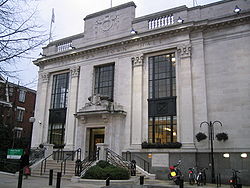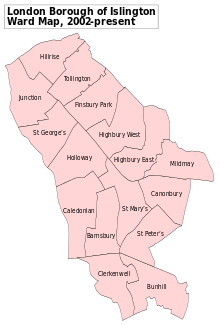Islington London Borough Council
Islington Council | |
|---|---|
 Coat of arms
| |
 | |
| Type | |
| Type | |
| Leadership | |
Mayor of Islington |
Gary Heather |
Leader of the Council |
|
Deputy Leader |
Diarmaid Ward, Labour |
Leader of the Opposition |
|
Acting Head of Paid Service |
Stephen Biggs since July 2023 |
| Structure | |
| Seats | 51 councillors |
 | |
Political groups |
|
Length of term |
4 years |
| Elections | |
| First past the post | |
Last election |
5 May 2022 |
Next election |
2026 |
| Meeting place | |
 | |
| Islington Town Hall | |
| Website | |
| www | |
Islington London Borough Council serves as the local authority for the London Borough of Islington located in Greater London, England. This council was established under the London Government Act 1963 and took over the roles of two previous local authorities: Finsbury Metropolitan Borough Council and Islington Metropolitan Borough Council.
As a London borough council, it is one of the 32 councils within the capital city of London in the United Kingdom. Islington is subdivided into 17 wards, each responsible for electing three councillors. Following the May 2022 elections, Islington Council comprises 48 Labour Party councillors and 3 Green Party councillors. Among these 51 councillors, Councillor Kaya Comer-Schwartz holds the position of the council's Leader, while Councillor Marian Spall serves as the Mayor.
History

There have previously been a number of local authorities responsible for the Islington area. The current local authority was first elected in 1964, a year before formally coming into its powers and prior to the creation of the London Borough of Islington on 1 April 1965. The present Islington Borough Council replaced Finsbury Metropolitan Borough Council and Islington Metropolitan Borough Council. Both were created in 1900, in Islington the borough council replaced the parish vestry. Finsbury had a more convoluted history with the metropolitan borough council replacing the Vestry of the Parish of St Luke, the Vestry of the Parish of Clerkenwell and the Holborn District Board of Works (for Glasshouse Yard and St Sepulchre).
It was envisaged that through the London Government Act 1963 Islington as a London local authority would share power with the Greater London Council. The split of powers and functions meant that the Greater London Council was responsible for "wide area" services such as fire, ambulance, flood prevention, and refuse disposal; with the local authorities responsible for "personal" services such as social care, libraries, cemeteries and refuse collection. This arrangement lasted until 1986 when Islington Council gained responsibility for some services that had been provided by the Greater London Council, such as waste disposal. Islington became an education authority in 1990. Since 2000 the Greater London Authority has taken some responsibility for highways and planning control from the council, but within the English local government system the council remains a "most purpose" authority in terms of the available range of powers and functions.
Powers and functions
The local authority derives its powers and functions from the London Government Act 1963 and subsequent legislation, and has the powers and functions of a London borough council. It sets council tax and as a billing authority also collects precepts for Greater London Authority functions and business rates. It sets planning policies which complement Greater London Authority and national policies, and decides on almost all planning applications accordingly. It is a local education authority and is also responsible for council housing, social services, libraries, waste collection and disposal, traffic, and most roads and environmental health.
Politics
Islington Council is elected every four years, with 48 councillors being elected from 16 wards. From 1964 to 1998, Labour controlled the council, apart from a 3-year period of Conservative control from 1968 to 1971, and a brief period of SDP control between 1981 and 1982, following the defection of Labour councillors together with MP Michael O'Halloran. The Liberal Democrats then had a majority from 1999 to the 2006 election, but continued to run the council as a minority administration until 2010 when Labour won a majority. In 2013, Labour won a seat from the Liberal Democrats in a by-election, and one Liberal Democrat councillor resigned the whip to sit as an independent, leaving the political composition of the council as 36 Labour, 11 Liberal Democrat and 1 Independent. As of the 2022 election the council is composed of the following councillors:
| Party | Councillors | |
|---|---|---|
| Labour | 48 | |
| Green Party | 3 | |
| Total | 51 | |
In November 2020, former mayor Rakhia Ismail, who was originally elected as a Labour councillor for Holloway ward, defected to the Conservative Party, giving the party their first representation on the council since 1994.
In May 2021, Kaya Comer-Schwartz was elected unopposed as Leader of the council, replacing Richard Watts.